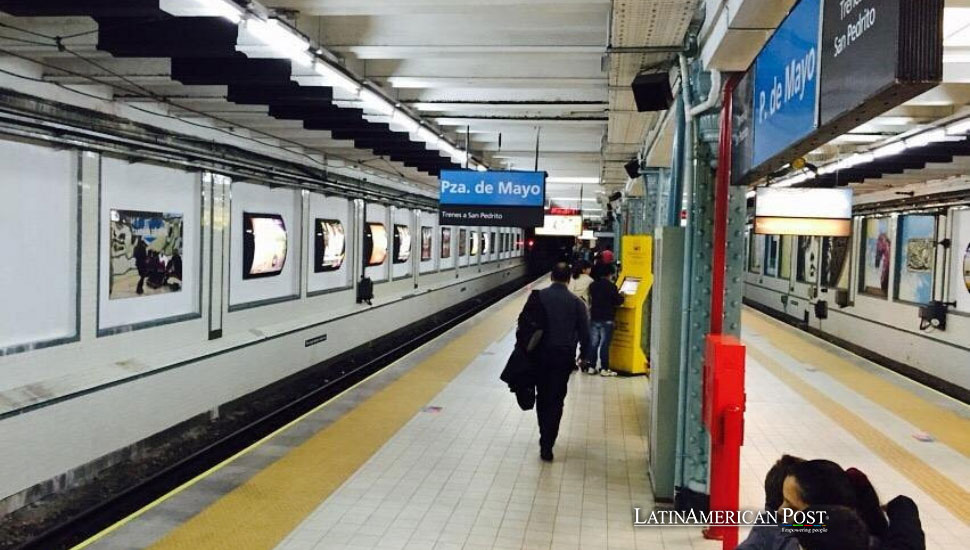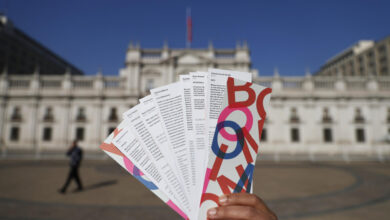Buenos Aires Subway Fare Hike Reflects Argentina’s Deepening Economic Crisis

A 360% increase in Buenos Aires subway fares underscores the severe impact of President Javier Milei’s austerity measures. These measures, which include significant cuts to public spending and the removal of subsidies, have exacerbated Argentina’s economic woes and sparked outrage among commuters in South America’s oldest subway system. The fare hike is a direct result of these measures, as the government seeks to reduce its financial burden and attract foreign investment.
Commuters in Buenos Aires were stunned on Friday by an abrupt 360% increase in subway fares, one of the most dramatic price hikes in libertarian President Javier Milei’s harsh budget austerity campaign in Argentina. After weeks of hearings, a judge on Thursday lifted an order temporarily blocking the scheduled increase in subway fares. That cleared the way for the change to take effect Friday morning as office workers across Buenos Aires streamed through the turnstiles of South America’s oldest subway system.
Public transportation fares are a sensitive issue across Latin America, where inequality is deeply entrenched. Outrage triggered by subway price hikes has sparked social unrest in the past, such as Chile’s 2019 mass protests. Overnight, the price of a single ride in Buenos Aires more than tripled from 125 pesos (14 cents) to 574 pesos (64 cents), exacerbating a painful cost of living crisis in Argentina. Some commuters complained they were suddenly paying triple for a network that was only deteriorating. The fare hike disproportionately affects low-income commuters who rely on public transportation for their daily commute, further exacerbating the inequality in the country.
Milei is slashing public spending on everything from subsidies to state companies as part of a radical free-market experiment to rebuild Argentina’s credibility with foreign investors and tame hyperinflation. But at least in the short term, his deregulation and austerity measures have pushed up inflation — now at 289% annually, among the highest rates in the world — and made life harder for ordinary Argentines as the economy slips into recession.
Historical and Regional Context
Public transportation fare hikes are not merely financial adjustments; they are politically charged decisions that can ignite widespread unrest. In 2019, a modest increase in subway fares in Santiago, Chile, led to massive protests that evolved into a nationwide movement demanding comprehensive social reforms. Similarly, in Brazil, fare hikes have historically triggered significant demonstrations, highlighting the deep inequalities and discontent within urban populations. These examples serve as a stark reminder of the potential consequences of the fare hike in Buenos Aires.
Latin America’s history of inequality and economic instability often makes transportation costs a flashpoint for broader social grievances. Subsidized fares have long been a critical support for low-income residents who rely on affordable public transport to commute from peripheral areas to city centers for work. Low fares have been a boon for residents in Buenos Aires, especially those priced out of central Buenos Aires who commute long distances to work. But these subsidies also constitute a growing cost that the heavily indebted government says it can’t afford amid Argentina’s worst financial crisis in two decades. The fare hike, therefore, has a significant impact on the daily lives of many Argentines, particularly those who rely on public transportation for their daily commute.
The Buenos Aires underground transit system, known as Subte, was one of the first in the world, a symbol of the city’s early 20th-century wealth. However, it has fallen into disrepair over recent decades. The sudden fare increase has left many commuters, already struggling with high inflation and economic uncertainty, feeling abandoned by the state.
Municipal officials in Buenos Aires announced that fares would reach 650 pesos (73 cents) on June 1, with another increase to 757 pesos delayed until August 1 to “minimize the impact on riders’ pockets.” However, the incremental increases provide little solace to commuters witnessing their purchasing power erode rapidly.
Economic Policies and Their Fallout
Milei’s austerity measures are part of a broader strategy to reduce public spending and attract foreign investment. His administration argues that cutting federal subsidies for public transportation is necessary to address the budget deficit and reduce reliance on international loans. However, the immediate effect has been to increase the financial burden on ordinary citizens. The fare hike, in particular, could have negative implications for the government’s credibility and its ability to attract foreign investment. If the fare hike leads to widespread social unrest or a decline in public services, it could undermine the government’s efforts to stabilize the economy and attract foreign investors.
Inflation in Argentina has soared to 289%, one of the highest rates globally. This hyperinflation and a shrinking economy have led to a severe cost of living crisis. Essential goods are increasingly unaffordable, and the spike in transportation costs adds to the financial strain on households.
This is the third time this year that inflationary spikes have hit subway fares, which were just 80 pesos last December. The price hikes have also affected buses and trains in Buenos Aires, although less dramatically than the subway. The fare increases highlight the tension between necessary economic reforms and their social impact. In the long term, the fare hikes could lead to a decline in public transportation usage, which could further strain the already overburdened road network and increase traffic congestion. This, in turn, could have negative implications for the economy and public services.
The Historical Significance of the Subte
The Buenos Aires subway system, inaugurated in 1913, was the first in Latin America and a source of national pride. It symbolized Argentina’s early 20th-century prosperity and modernity. The construction of the subway system was a monumental feat, with its tunnels and stations representing a significant engineering achievement. However, years of neglect and underinvestment have left the system struggling to keep up with the demands of a growing population.
The current state of the Subte reflects broader issues within Argentina’s infrastructure and public services. Many subway cars need to be updated, and maintenance is often delayed due to budget constraints. While intended to provide additional revenue, the fare hike risks further alienating the public if improvements are seen slowly.
The fare hike in Buenos Aires is more than just a local issue; it reflects Argentina’s broader economic challenges. The country’s reliance on subsidies and state intervention has long been a double-edged sword, providing necessary support during tough times and contributing to fiscal imbalances. These challenges are not unique to Argentina but are part of a broader economic landscape in Latin America, where many countries are grappling with high inflation, low economic growth, and rising debt.
Milei’s government faces the difficult task of balancing fiscal responsibility with social stability. Cutting subsidies and implementing austerity measures are necessary to stabilize the economy, but they come with high social costs. The challenge is implementing these changes in a way that does not exacerbate social inequalities or lead to widespread unrest.
The Road Ahead
The future of Argentina’s public transportation and broader economic stability depends on the government’s ability to navigate these complex challenges. Investment in infrastructure, better management of public resources, and effective communication with the public are crucial. Ensuring that tangible service improvements accompany fare hikes could mitigate public discontent. Additionally, exploring alternative funding sources, such as public-private partnerships, could help alleviate the financial burden on the government and reduce the need for fare hikes.
Moreover, addressing the root causes of inflation and economic instability is essential. This includes tackling corruption, improving efficiency in public spending, and fostering a more favorable environment for economic growth. The immediate concern for commuters in Buenos Aires is the affordability of daily transportation. The challenge for the government is to create a sustainable financial model that supports fiscal health and social equity.
The dramatic increase in subway fares in Buenos Aires is a stark reminder of Argentina’s broader economic crisis. While necessary for addressing fiscal challenges, President Milei’s austerity measures have significant social implications. The historical context of public transportation fare hikes in Latin America shows that such measures can spark widespread unrest if not managed carefully.
Also read: Chronicle: This Is How Argentine Inflation Is Experienced In a Buenos Aires Market
The challenge for Argentina is to balance the need for economic reforms with the imperative to protect its most vulnerable citizens. The future of the country’s public transportation system and overall financial stability will depend on the government’s ability to navigate these tricky waters. As Buenos Aires commuters adjust to the new fare structure, the eyes of the nation—and the world—will be watching closely to see how Argentina tackles its most pressing economic challenges.




